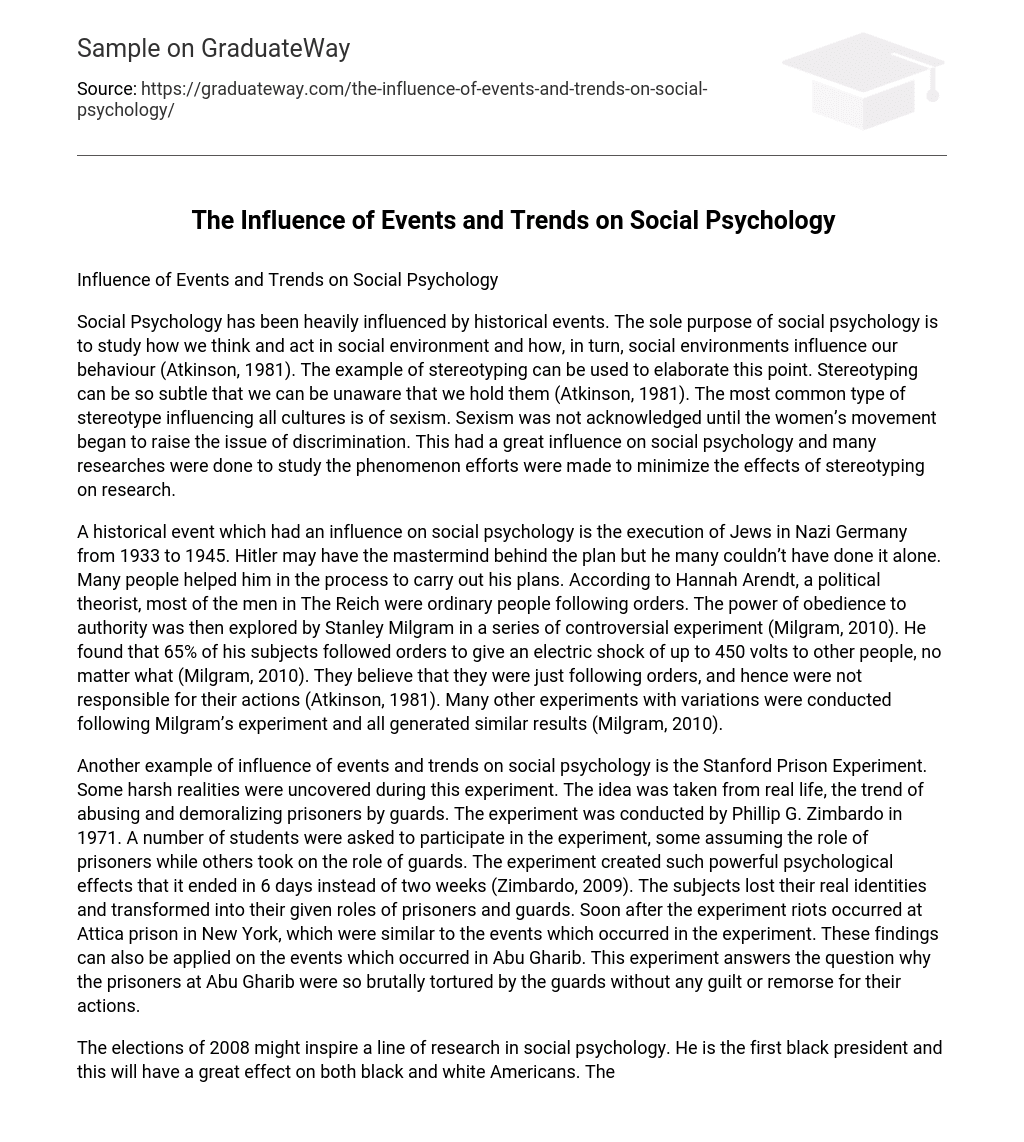Social Psychology has been heavily influenced by historical events. The sole purpose of social psychology is to study how we think and act in social environment and how, in turn, social environments influence our behaviour (Atkinson, 1981). The example of stereotyping can be used to elaborate this point. Stereotyping can be so subtle that we can be unaware that we hold them (Atkinson, 1981).
The most common type of stereotype influencing all cultures is of sexism. Sexism was not acknowledged until the women’s movement began to raise the issue of discrimination. This had a great influence on social psychology and many researches were done to study the phenomenon efforts were made to minimize the effects of stereotyping on research.
A historical event which had an influence on social psychology is the execution of Jews in Nazi Germany from 1933 to 1945. Hitler may have the mastermind behind the plan but he many couldn’t have done it alone. Many people helped him in the process to carry out his plans. According to Hannah Arendt, a political theorist, most of the men in The Reich were ordinary people following orders.
The power of obedience to authority was then explored by Stanley Milgram in a series of controversial experiment (Milgram, 2010). He found that 65% of his subjects followed orders to give an electric shock of up to 450 volts to other people, no matter what (Milgram, 2010). They believe that they were just following orders, and hence were not responsible for their actions (Atkinson, 1981). Many other experiments with variations were conducted following Milgram’s experiment and all generated similar results (Milgram, 2010).
Another example of influence of events and trends on social psychology is the Stanford Prison Experiment. Some harsh realities were uncovered during this experiment. The idea was taken from real life, the trend of abusing and demoralizing prisoners by guards. The experiment was conducted by Phillip G. Zimbardo in 1971. A number of students were asked to participate in the experiment, some assuming the role of prisoners while others took on the role of guards. The experiment created such powerful psychological effects that it ended in 6 days instead of two weeks (Zimbardo, 2009).
The subjects lost their real identities and transformed into their given roles of prisoners and guards. Soon after the experiment riots occurred at Attica prison in New York, which were similar to the events which occurred in the experiment. These findings can also be applied on the events which occurred in Abu Gharib. This experiment answers the question why the prisoners at Abu Gharib were so brutally tortured by the guards without any guilt or remorse for their actions.
The elections of 2008 might inspire a line of research in social psychology. He is the first black president and this will have a great effect on both black and white Americans. The attitude of American might change toward black Americans and significant decline in discrimination might be seen. Another possibility is that some white Americans may become prejudiced and more hostile toward black Americans.
Black Americans, on the other hand, will gain more confidence and finally feel more accepted in the society. Either way, this is going to have a great effect on the social environment and attitudes of people in general. Though it is said that there no longer is discrimination on the basis of race but it is still prevalent in the society. Since these differences have been present for centuries in the culture, having a black president will have an influence on the society, consciously or unconsciously.
References
- Atkinson, R. L. (1981). Introduction to Psychology. New York: Harcourt Brace Jovanovich.
- Milgram, S. (2010). Obedience to Authority. Retrieved June 7, 2010, from http://www.age-of-the-sage.org/psychology/milgram_obedience_experiment.html
- Zimbardo, P. G. (2009). The Stanford Prison Experiment. Retrieved June 7, 2010, from http://www.prisonexp.org/psychology/39





